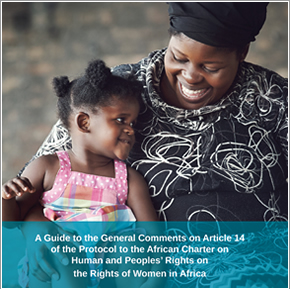On 21 April 2015 at the 56th Ordinary Session of the African Commission on Human and Peoples’ Rights (African Commission) in the capital of the Gambia, Banjul, the African Commission in collaboration with IPAS Africa Alliance launched General Comments on Article 14 of the Protocol to the African Charter on Human and Peoples’ Rights on the Rights of Women in Africa (the Maputo Protocol). This guide was distributedin Banjul but it is also available for download.
![]() Download the Guide to the General Comments on Article 14
Download the Guide to the General Comments on Article 14
Our hope is that the guide, together with the General Comments, will serve to strengthen advocacy towards and realisation of the health and reproductive rights of all women in Africa.
General Comments are instruments that are used to explain the meaning of certain rights and to clarify what actions states should take in order fully to realise the rights that are contained in a particular treaty. The General Comments being launched next week relate to article 14 of the Maputo Protocol, a regional human rights instrument that seeks to improve the status of all women in Africa. The Maputo Protocol supplements the African Charter on Human and People's Rights and to date it has been ratified by 36 African states.
Two General Comments have been issued on Article 14 to the Maputo Protocol, which relates to women's health and reproductive rights. The first General Comments, which were adopted in 2012, focus on the provisions of article 14 which relate to STI's, HIV and AIDS. The second set of the General Comments on article 14 speak to the specific actions that states should take in order to guarantee the health and reproductive rights of women.
As a supplement to the General Comments on article 14, the Centre for Human Rights, with the generous support of the Sigrid Rausing Trust and Equality Now in collaboration with The Solidarity for African Women's Rights Coalition (SOAWR), prepared a guide which is intended to assist states parties to the Maputo Protocol better to understand the commitments contained in article 14. The guide also aims to support civil society in efforts to hold governments accountable for their obligations contained in article 14.
![]()
For more information, please contact:
Katy Hindle
Programme Manager: Gender Unit
Centre for Human Rights, Faculty of Law
University of Pretoria
Tel: (012) 420 4525
Email: katy.hindle@up.ac.za
www.chr.up.ac.za
